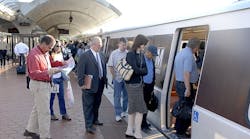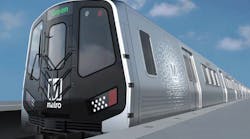WMATA Board approves $4.8 billion FY25 budget
A $4.8 billion capital and operating budget has been approved by the Washington Metropolitan Area Transit Authority’s (WMATA) Board of Directors, which will maintain bus and rail service levels. The new budget year begins on July 1, with investments coming from around the region.
Previously, WMATA faced potential cuts to service as the agency faced an unprecedented $750-million budget gap because of record inflation, more people working from home and exhausting the last of the federal COVID-19 relief funds for transit.
WMATA averted those cuts thanks to investments from its regional partners and sacrifices from many different parties:
- All three jurisdictions, including Washington, D.C., Maryland and Virginia, each provided millions of dollars of additional funding to help meet the Fiscal Year (FY) 2025 budget gap.
- WMATA found $50 million in cost efficiencies.
- Customers will see a 12.5 percent fare increase, which keeps fares in line with inflation.
“We appreciate the collaboration of our regional partners on this board-approved budget that will keep our community moving,” said Metro General Manager and CEO Randy Clarke. “This region is a great place to live, work, and play and our recent ridership reflects the vital role Metro plays in getting people where they need to go. Thank you to our Metro employees for their fantastic work to bring back our region’s confidence and trust.”
“We want to thank our elected officials and jurisdictional partners for the historic commitments they have made to Metro and the region to keep Metro strong in the coming years,” said Metro Board Chair Paul C. Smedberg. “Over the next year, we’re looking forward to continuing a robust conversation with jurisdictional partners, elected officials, and business and community stakeholders around Metro’s role in the region and how the region can sustain and support the world-class transit that the DMV deserves. We also acknowledge that, while this budget maintains the frequent and reliable service our customers rely on, it asks for a shared sacrifice from our employees and customers to make it work. On behalf of the board, we’re grateful for their continued support.”
WMATA will continue to deliver frequent all-day, all-week Metrorail service to drive ridership. Bus customers will see similar levels of service as this year. In the next FY, WMATA will begin to implement its Better Bus Network Redesign plan.
Bus fares and base rail fares will increase from $2 to $2.25. The maximum rail fare will increase from $6 to $6.75. Late-night and weekend fares will rise from a flat $2 to a variable charge between $2.25 and $2.50 based on distance. MetroAccess fares will be capped at $4.50, up from $4. Pass products will also increase. WMATA is also equipping bicycle lockers with an hourly rental feature, with a rate of 5 cents an hour, up to $1.00 per day. Parking fees will not change.
The $2.3 billion capital budget invests in the system to modernize and provide safe, efficient and reliable service for customers, employees and the region by addressing a backlog of overdue state-of-good-repair needs and replacing aging equipment. The plan allocates money for purchasing 256 new 8000-series railcars, investing in more electric buses, replacing aging bus garages, maintaining track and vehicles and working toward a modern automated train control signaling system.
WMATA's FY 2025 budget runs from July 1, 2024, to June 30, 2025.
Next FY, WMATA will face a similarly difficult budget without dedicated funding. WMATA is the only major transit system in the country that does not have some form of predictable, sustainable funding.
On May 1, WMATA’s Board of Directors will meet with the regional Metropolitan Washington Council of Governments’ Board. At this meeting, they will discuss the vision for transit in the future and ways to fund that vision.
More information on WMATA's FY 2025 budget can be found here.




